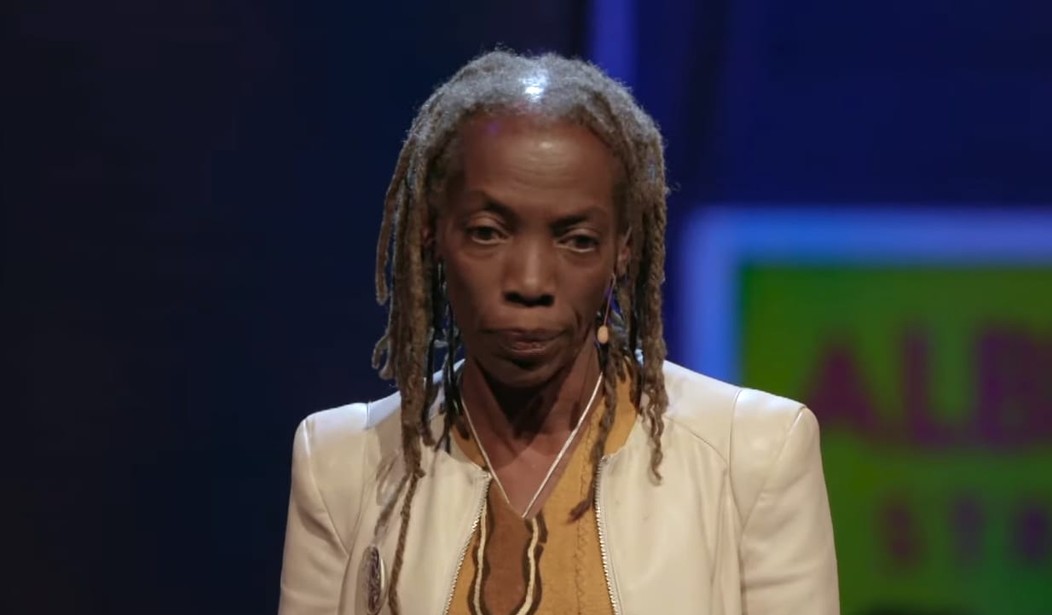For the second time in recent years, Jo Ann Hardesty has been sued by a bank for non-payment of a debt. This may be the least of her problems, however. Her response, naturally, is to create a diversion by suing the City of Portland and the Portland Police Bureau. When one looks past the diversion and examines her history, one can clearly see a pattern of mismanagement in Hardesty’s personal life, along with several incidences of breaching organizational trust. This begs the question: how responsible can she be as a public servant?
The most recent lawsuit concerns a credit card debt Hardesty appears to have blown off, leading to a simple suit in circuit court to obtain a judgment and enforce repayment. If negotiations for repayment fail, such a judgment is often followed by court orders for wage garnishment, bank account garnishment, or even a property lien.
Bank of America filed suit against Hardesty in November over two credit card debts totaling $16.051.54. She was served with legal notice of the filing on Dec. 1 and has 30 days from that date to respond in writing, or a default judgment will be entered against her. Hardesty has not yet responded to the court filing but issued a public statement acknowledging the debts:
In a written statement, Hardesty said she intends to pay the bank the money she owes.
“When I ran for City Council in 2018, like many working people I was reliant on a credit card and built up debt. I live alone, without help, and put all of myself into my work at the City,” Hardesty said. “Sometimes that means I neglect to take care of personal matters. I tried to work out a payment plan before with this debt that didn’t work out and intend to pay this off.”
An attorney for Bank of America contacted Hardesty at least a month before filing the lawsuit demanding she pay the outstanding balance on her accounts, but later wrote in court filings she “has failed or refused to pay the balance due.”
Notably, Hardesty earns a salary as a city councilor north of $127,000 while living in a small apartment in East Portland. Hardesty has made no comment so far as to why she hasn’t paid back the debts.
Never mind her cushy public salary, with which the 64-year-old Hardesty could easily have paid off these debts with a minimum of responsible budgeting. Her written statement that she ran into debt while campaigning for office doesn’t hold water. An examination of her campaign contributions from 2017 through 2020, maintained at the Oregon Secretary of State’s website, shows she raised over half a million dollars for her campaign—$514,398.30, to be exact.
Hardesty’s statement that “as a working person” she ran into credit card debt allows for one of two conclusions: either she illegally commingled personal credit cards with her campaign expenditures or she didn’t have a job while campaigning, which belies her claim as a “working person.”
When one probes Hardesty’s history, a clear pattern of mismanagement emerges. There is an endless list of unpaid parking tickets, previous lawsuits; unpaid taxes, allegations of substance abuse and a possible gambling problem, accusations of impropriety in her time as head of the local chapter of the NAACP, and, of course, the allegation of involvement in a hit and run accident. While the Portland Police Bureau claimed less than 24 hours after the accident that they didn’t consider Hardesty a suspect, questions linger.
All along, her response is to accuse those talking about her of racism against the city’s only female of color on the city council and to file lawsuits.
Just this month, in fact, she’s filed suit seeking $3 million in damages from the union for the Portland Police, two officers, and the city itself:
Hardesty seeks $3 million from the [Portland Police Association] and $1 million each from Hunzeker and Ottoman. The City of Portland is also named as a defendant, although the lawsuit seeks only a single dollar from the city along with a declaration that the city violated Hardesty’s rights to freedom from racial discrimination.
As we will see, however, rather than victim status, Hardesty’s history indicates, at minimum, a complete lack of personal responsibility—and at most, possible deliberate malfeasance.
Previous Lawsuits
Bank of America is not the first creditor who has sued Hardesty over unpaid debt. According to The Oregonian:
The allegations come months after a separate creditor sued the commissioner over $4,400 in unpaid debt, records show. That case has since been resolved, according to Hardesty and court documents.
Incredulously, Hardesty tells The Oregonian not to judge her by her personal financial peccadilloes, or any other part of her life prior to 2019:
“I understand my personal debt may cause concern since I am one of five commissioners voting on our city budget,” Hardesty told The Oregonian/OregonLive in an emailed statement. “I ask to be judged on my three years as an elected city commissioner.”
Calling herself a “budget hawk,” the commissioner touted that she’s had a seasoned financial policy analyst on her staff since she entered City Hall in 2019. Hardesty, who is running for re-election next year, also mentioned her longstanding record of pushing for measurable outcomes and accountability across an array of city budget decisions.
“I have been an excellent steward of public dollars and that is what Portlanders elected me to do,” she said.
But the commissioner conceded she has struggled to keep up on her personal finances, despite earning an annual city salary of more than $125,000 for each of the last three years. She said that while she has poured her “heart and soul” into her City Hall job, she has neglected to prioritize her own needs and responsibilities.
In addition, Hardesty had a lien over unpaid federal taxes in 2007, for an amount just north of $16,000. The lien was released in 2009.
Traffic Tickets
In a vacuum, having a long string of unpaid parking tickets doesn’t amount to much, and a few speeding tickets doesn’t disqualify someone from public office (even if you got convicted on one after failing to appear for your hearing). In the context of a public official in charge of the Portland Bureau of Traffic, who votes on the city budget, and has sued the city multiple times as a sitting city councilor while waging a public campaign to defund the police and failing to take responsibility for her personal debts, it does raise questions.
For the record, Hardesty has all of the above on her driving record.
Gambling?
There are no credible accusations of problem gambling at this time against Hardesty. One wonders, however, why she’s been seen multiple times at ilani Casino in Ridgefield, Wash., including the night she improperly called 911 on her Lyft driver after a night at the slot machines, instead of using her taxpayer-paid salary to take care of the debts that ultimately led to her getting sued.
Substance Abuse?
Hardesty took an unexplained leave of absence in the summer of 2021. Even before that, rumors had swirled that she might have a substance abuse issue. Many wondered openly if the leave of absence could have meant that she checked into rehab:
Since her leave of absence began, Hardesty has been absent from the public eye. The local rumor mill has churned non-stop, however, since mid-summer. It’s important to reiterate that this is pure speculation. Andy Ngo of The Post Millennial finally gave public voice to what many have heard from sources at city hall:
https://twitter.com/MrAndyNgo/status/1430365258292637701?ref_src=twsrc%5Etfw
Is the city council woman currently in rehab?
— Andy Ngô 🏳️🌈 (@MrAndyNgo) August 25, 2021
Multiple inquiries to her office went completely unanswered.
The NAACP Issue
Hardesty claimed she was “in the process of correcting” her financial errors as president of the Portland chapter of the NAACP—sound familiar?
But records and interviews raise questions about financial oversight and record keeping of the NAACP chapter during Hardesty’s term and her attention to details.
The Portland branch lacked or failed to enforce the financial controls most nonprofits use to ensure they can account for their spending — controls that are spelled out in a bookkeeping guide the national NAACP publishes for its members annually.
Records also show that while Hardesty has characterized her work as the Portland branch president as volunteer service, she collected more than $13,000 in income from the organization in 2017, including a travel stipend and a payment to her for-profit consulting business. Hardesty and the NAACP chapter did not report that income to the IRS or pay taxes on it. Hardesty said she is now correcting her personal income tax returns.
This lady makes a lot of mistakes.
The Hit And Run
So, when the Portland Police Bureau (PPB) put out a statement that they had ruled out Hardesty as a suspect in a March 2021 hit and run accident, that closed the case, right?
Not exactly. Many questioned how deeply the PPB investigated the report before putting out their statement about 18 hours after the news exploded. The original complaint said an African American woman matching the description of Jo Ann Hardesty, driving a late model tan-colored four-door Toyota or similar model, rear-ended another driver and then left the scene. Subsequent media reports, based on police statements, implicated a different African American woman, who lives in Vancouver, Wash., and does not match the description of Hardesty, based on traffic camera footage from about 20 blocks away from the incident.
It didn’t make sense.
Speaking of not making sense, Hardesty held a press briefing to address the allegations. The appearance was downright unhinged. She stated that she had a car like that and didn’t know the make and model of it, but that she had donated it the night before to the Volunteers of America by parking it at their lot down the street from her apartment. She said because of COVID, the title had not yet been changed over—another excuse that made zero sense.
Of course, when asked to provide the documentation that she had indeed donated the vehicle, she couldn’t find it. She assured the assembled reporters she would provide it as soon as possible.
Weirdly, no member of the local press ever followed up on her promise, and no documentation of the donation has ever been shown. Importantly, the parking lot where Hardesty claims to have donated the vehicle doesn’t accept donations in that manner, and a different facility across town accepts donations after a lengthy intake process involving a lot of paperwork and a title change application—a copy of which she would possess, if it existed.
In fact, a vehicle matching the description has been identified that is registered in Hardesty’s name. That vehicle is a Volvo X60, four-door, gold in color.
Not a single member of the Portland media followed up on Hardesty’s vehicle records to confirm her bogus claims that a vehicle still registered to her had been donated and could possibly have been the vehicle involved. Instead, they bought a bogus claim of some other African American woman, on traffic cams 20 blocks away, driving a silver sedan. Of course, that woman was never charged in the incident either.
Conclusions
In a sane world, Jo Ann Hardesty would long ago have exhausted the trust placed in her, her performance as city councilor, and her never-ending string of excuses. Instead, she plows headlong into more lawsuits against her employer, because the only possible explanation for her behavior is white supremacy and dirty cops. It remains to be seen if the voters in Portland will give a damn.










Join the conversation as a VIP Member